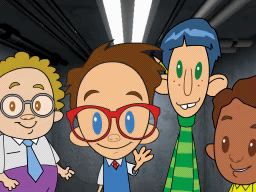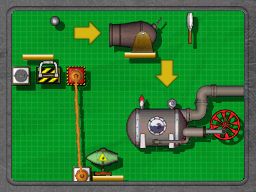Bare-bones puzzling evocative of The Incredible Machine; cartoon decor by Marc Eckō
Physics are a little iffy; somewhat pointless story framework/title
We’ve reviewed a few games before with gameplay reminiscent of The Incredible Machine, the classic computer game that tasked players with creating a Rube Goldberg machine of sorts, and they’re usually fairly cookie-cutter. I Heart Geeks, another DS game in the line of Crazy Machines and The Incredible Machine, tries to avoid this mundane trap with a rudimentary narrative. In an effort to attract female attention and escape bullies, Milton, Theodore, Gilbert and Eugene– the eponymous Geeks– must solve various puzzles with wacky tools at hand, in truly MacGyver-esque fashion.
That said, this narrative is not particularly important to the game, because it’s just an excuse to make a game like The Incredible Machine— you’ll only ever realize you’re playing a game involving geeks, jocks and cheerleaders with the opening animation (by fashion designer Marc Eckō’s entertainment company), and busy yourself with actually solving puzzles for the bulk of the game. That said, there are glimpses of What Could Have Been; some puzzles involve you helping the Geeks escape bullies, whether it’s with giant robot inventions or normal everyday tools. It’s all about the puzzles, though: I Heart Geeks knows what kind of game it is, and it focuses on that.

Marc Eckō Enterprises brings rudimentary character to otherwise The Incredible Machine-esque game.
As you’ve probably seen by now, games like The Incredible Machine task players with very simple objectives: throw the ball in the pit, balance the weights, pop this balloon. Of course, these objectives are always to be solved with seemingly inadequate tools, and often ones that definitely don’t look up to the job. These often consist of bicycle chains or gears, but some games have more creative tools. I Heart Geeks, for instance, lets players use catapults, or the aforementioned robot inventions. This in one sense is very cool, and on another sense is a little frightening– some tools really don’t seem like they’re worth a darn, which is of course the whole point of the game. The Rube Goldberg machine-building exercises of these games are always rewards unto themselves, and very much literalize the “puzzle” in “puzzle games.”

And as far as those puzzles go, I Heart Geeks is fine. Puzzles are divided by character– Milton has the easiest, then Theodore, Gilbert, and Eugene. There are hundreds of these puzzles, each harder than the one before, with only two tutorial stages to get you started– though really, that’s all you need. Buttons control the angle of placement, whereas movement is handled with the touch screen. Unfortunately, no effort was made to do anything else with the touch screen (other than access help menus and tools), and I would have liked to see the DS’ touch capabilities utilized more cleverly– even allowing players to change angles of tools via touch, possibly by touching the edges of the tools, would have been nice. Nevertheless, button control is adequate and does the job well.
Yet the physics of the game are a little questionable– which is dangerous in a game that is, almost literally, a manifestation of physics. Often I was able to beat a stage by exploiting unusual physics variations– I couldn’t figure out how to arrange my catapults in one stage to get a ball to the other side of a wall, for instance, and instead forewent the catapults’ intended function (read: launching things) and just bounced my ball off of them until, many seconds later, it landed on the other side. Of course often this took a longer time– the game tracks both level time records and cumulative time records for viewing in its Noble Prize (read: time rankings) mode– but it was odd that I could do it at all. At one point I wondered if I should go back and try to figure out the “right” way to solve all these puzzles, while simultaneously wondering if such blatant physics manipulation was actually the “right” way to solve them. (It’s too bad there’s no holistic review function in this game– I feel like my creativity should’ve given me extra points.) As far as the number of actual tools to be used, it seemed to be on par with other The Incredible Machine-style games, which is nice.
All in all, I Heart Geeks is really just The Incredible Machine gussied up with new paint, courtesy of Marc Eckō and his company. The story framework is just that– a very, very loose framework– and new tools, though interesting, don’t do anything particularly newfangled. That said, if you’re looking to play a game like The Incredible Machine, you could do worse than I Heart Geeks. It’s a game that is full of puzzles, and that’s really all you need.




 ShareThis
ShareThis






